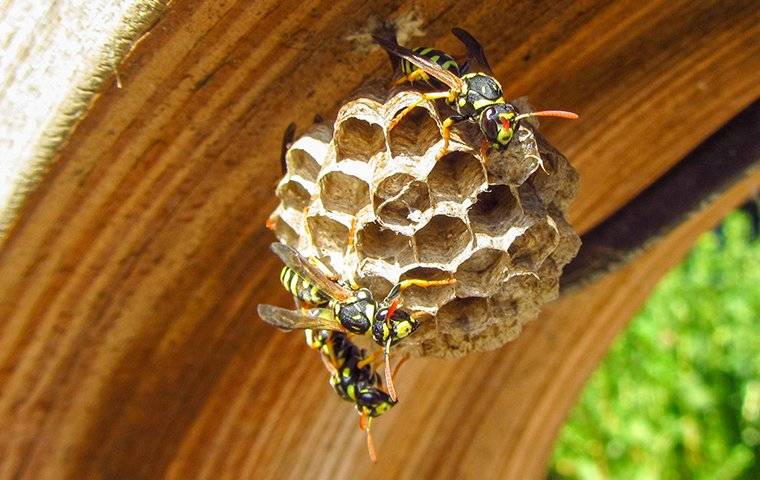
Complete Guide To Stinging Insects In Raleigh
Go-Forth Home Services provides pest management solutions to help Raleigh residents and business owners deal with a wide range of pests. On the top of the list for some of our customers is stinging insects. While these are common pests, most people don't really know all that much about them. Some people refer to certain wasps as bees. Some reference certain bees as hornets. Today, we're going to clear things up and give you everything you need to know about stinging insects in Raleigh. Most of all, we'll tell you what you can expect from these insects when they enter your yard and how to avoid insect bites and stings. If that sounds like fun, continue on. If you'd rather have a pest professional give you advice over the phone and guide you toward a solution for stinging insect pest control in Raleigh, we're happy to help with that. We're here to help you find solutions to all of your pest concerns! With that said, let's take a look at common stinging insects in Raleigh.

Types Of Stinging Insects That Call Raleigh Home
We have quite a mix of stinging insects in our Raleigh service area. While stinging pests fall into three categories you're likely aware of (bees, wasps, and hornets), there are differences between them that they share across categories. There are also several species of each. Let's take a look at these stinging pests and break them down by common traits.
- Some are solitary insects. These don't gather into a swarm to attack. In fact, they rarely attack at all. The primary concern with these pests is that you can accidentally sit on one while attempting to relax in your yard.
- Some are social insects. These stinging pests defend their nests aggressively. If you get too close, they'll let you know it.
- Some have barbed stingers. These pests can only sting you once because their stinger gets stuck. This often leads to the death of the insect.
- Some have smooth stingers that have no barbs. These pests can grip onto you and sting multiple times.
- Some create aerial nests. You'll find these paper structures on tree branches, in bushes, on the exterior of your home, and under rooflines.
- Some create nests in the ground. These pests can surprise you while you're tending to your landscaping, or when you're mowing your lawn.
- Some create nests in structural voids. If they find a route to the interior of your home, they can give you an unwanted surprise.
As you can see, there is quite a variety. These traits are not limited to a particular category. For example, all bees are not solitary, and all wasps are not social. There are social wasps, bees, and hornets, and vice versa. Stinging insect identification is helpful because knowing facts about these pests can help you with stinging insect management, control, and prevention.
Why Stinging Insects Are Such A Problem For Raleigh Homeowners
You may think the answer to this heading is: "It is because they sting." While you would certainly be right, there is more to it. An insect that stings can cause problems you may not even realize. Let's begin by looking at the humble carpenter bee.
- Carpenter bees rarely sting. They are solitary bees. The primary issue with these pests is that they tunnel through wood. If you see holes that are perfectly circular or you notice damage to your back deck railing that looks like it could be morse code, you have a carpenter bee problem.
- Bumble bees sting—more than you might think. They are social insects with smooth stingers. Unlike other bees, they can sting you several times, and if you get close to a bumble bee nest, you're likely to regret it. The good news is that they don't swarm. But they will defend their nests if they are disturbed.
- Yellow jackets are highly aggressive little wasps that swarm in defense of their nests. If you're worried about insect bites and stings, these are the pests to keep watch for in your yard. They often create nests in the ground.
- Paper wasps create aerial nests and are known to defend their nests aggressively. They sometimes create nests in wall voids, making removal difficult, and presenting a stinging threat indoors.
- The hornets in our area are cousins to yellow jackets. They share their aggressive behavior patterns. But it is essential to know that their stings are considered more dangerous.
- All stinging insects can present a hazard for anyone with a stinging insect allergy. A bad reaction can create a life-threatening situation.
When it comes to dealing with stinging pests in Raleigh, the best solution is proactive management. You'll definitely want to see these wasps before they see you. Let's look at how stinging insect prevention works.
Stinging Insect Prevention Steps Every Raleigh Resident Should Know
The goal of stinging insect prevention is to consider the reasons these pests enter your yard and find their way into your home. If you alter conditions that are favorable to these pests, you can deter them. Each pest is somewhat different, and some of these tips are specific.
- Certain wasps are attracted to sources of protein, and the scent of rotting meat will attract them. It is essential that you keep trash in covered containers and wash your containers when they start to have an unpleasant odor.
- Wasps that are hunting for protein are attracted to yards that have lots of insects. You can deter insects by keeping lights off at night or by altering light conditions. For example, you can replace white outdoor lighting with yellow lighting solutions. Insects are not attracted to yellow light.
- All stinging insects are attracted to sources of nectar. If you have a lawn weed problem, it is likely that stinging insects will move in. One step toward a solution is to address lawn weeds.
- Stinging insects drink water. If you have a moisture problem resulting from a clogged gutter or leaking pipe, you can start to have a stinging insect problem.
- Stinging insects are attracted to sweet smells. If you have perfume, candles, or air fresheners, they can lure stinging insects to your property.
- Carpenter bees are attracted to sources of wood. You can specifically deter these pests by painting wood and by capping the ends of wood with metal flashing.
- Wasps and bees that get into wall voids are a pain. You can avoid that pain by using a caulking gun or expanding foam to fill in gaps, cracks, holes, and general entry points.
- Some wasps will create nests in bushes. Trim your landscaping and keep things neat to deter these pests.
- Wasps that create nests in the ground are not generally burrowing insects. For example, yellow jackets use holes created by burrowing animals. If you want to prevent a yellow jacket problem, it helps to fill in holes. Keep in mind that uneven mulch applications can create pockets large enough for yellow jackets, so make sure to rake the mulch that you are applying too your landscaping.
Simple steps like these can make a big difference when it comes to preventing issues with bees, wasps, or hornets, but are they enough? It depends on your threshold of tolerance. If you have zero tolerance for stinging insects, contact a professional. Let's look at a few more reasons why it may be time to call a professional.
When Is It Time To Call For Professional Stinging Insect Control?
Only you can decide when it is the right time to call a professional about stinging insects in North Carolina. The best we can do is provide you with the facts you need to make the best decision for you. So, when is the right time?
Before You See Stinging Pests: If you don't want to ever see these insects in your yard, now is the time to call a professional. You can contact a professional for preventative services. Your service provider will routinely inspect your yard, catch these pests early, and address them quickly.
When You See Or Hear Stinging Pests: If you have a nest in the ground or in a wall void, and you don't know how to remove it without getting stung, it is time to contact a professional. It is hard to remove a nest from a void. Professionals have the equipment, protective gear, and training needed to address difficult nest removal.
When You See A Big Nest: If you find a fully-formed nest attached to your home and don't know how to get it down and remove it safely, a professional can help. Professionals use safety protocols to make sure everything goes smoothly.
When You See A Starter Nest: If you see a little blob on your home and you can't reach it, a professional may assist you with a pest control solution. If that blob is within reach, you can deal with it yourself if you'd like. It is rarely necessary to contact a professional about a little starter nest. When you catch a nest early, you can use a broom to knock it down during the day. Make sure there are no female wasps on it when you do this.
When you need help with stinging insects in Raleigh, contact Go-Forth Home Services for assistance. We have the options you need for the effective removal and management of stinging insects.
Customer Reviews
-
“He spent time educating us about "pests" and provided information regarding services with GoForth.”- Joyce C.
-
“Texted me before coming. Worked with me playing musical rooms with my dogs. I'll see how things are.”- Constance E.
-
“Amazing response time, reasonable prices, great customer service. Tevin was thorough and confident in his plan to fix our horrendous fire ant problem. We have had negative experiences with prior exterminators and probably waited way too long to call Go-For”- Ashley T.
-
“- Toya B.
We have been customers for almost 7 years for a reason. Our technician is the best. He always knows exactly how to address whatever pest has decided to bother us. We have referred them to many of our neighbors. Well worth the cost not to have to worry a
” -
“Answered all my questions and I felt their pricing was very reasonable.”- Deborah J.
-
“Brian went above and beyond what was expected, and I hope I get him again as my technician for future services!”- Tam L.
-
“He was thorough with inspecting and treating our home, which I really appreciate, and he took the time to answer my many questions.”- Jasmine B.
-
“Love the detailed summary and pics of what he did and saw! And did I mention how wonderful Olivia was to get us all set up?!!”- Beechy A.


Over the years, we’ve boiled down our mission to a core set of values:
-
Give A CrapDelight others by owning your role and saying yes. Take pride in how you appear & act & every other detail of the job. Be on time, attentive, & enthusiastic. Act as if the buck stops with you on every aspect of the job.
-
Chase PerfectionChase Perfection, knowing full well we will not reach it, but along the way we will catch excellence. Have a sense of urgency; Go-Forth Time - right now might be the only time you have to get it right.
-
Dig Deeper
Be an action-oriented professional that makes decisions based on evidence rather than stories & assumptions. Stay curious. Data can speak for itself.
Understand the cause of the fire rather than rushing to extinguish it.
-
Fight For SimplicityKeep it simple & consistent. Focus on how things should be done every time.
-
Face It, Fix ItConfront challenges directly and address issues head-on. A bias for action and powerful conversations drive our progress. It’s about getting it right rather than being right.
-
Grow!Growth is our purpose. Growing as people & growing our business.